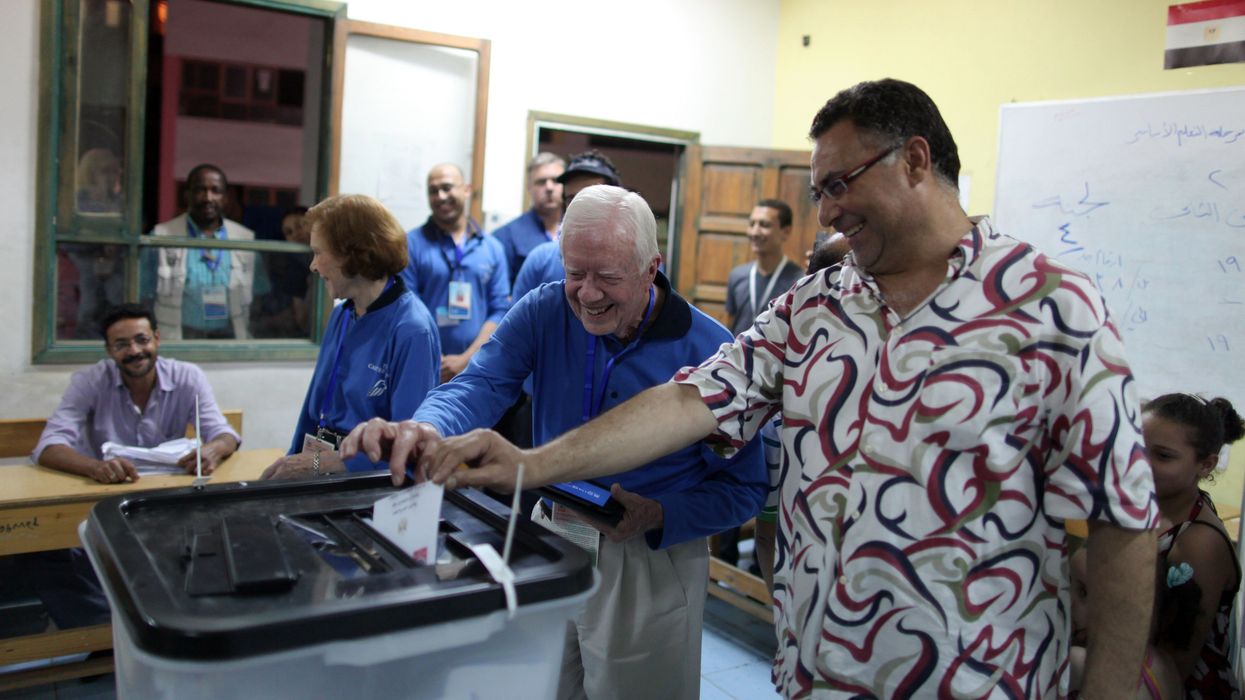Jimmy Carter has become the first former president to publicly support making mail-in voting a nationwide option this year.
His endorsement is important not only because he's among the few American elder statesmen with significant respect from voters of both parties. Carter has also spent much of the past three decades monitoring elections in other countries for signs of corruption. And he co-chaired a bipartisan commission that in 2005 labeled absentee ballots the easiest way to commit election fraud.
Republicans have frequently pointed to that conclusion in explaining their opposition to a widespread expansion of voting from home. But Carter on Wednesday said a wave of safeguards adopted in the past 15 years have changed his mind — and that the coronavirus pandemic makes a quick embrace imperative.
"I urge political leaders across the country to take immediate steps to expand vote-by-mail and other measures that can help protect the core of American democracy – the right of our citizens to vote," the 95-year-old Democrat said in a statement from the Carter Center, the global humanitarian and peacemaking nonprofit he created in 1982, a year after his single term in the White House ended.
Among the "series of critical challenges" to the country created by the Covid-19 outbreak, the center said, are "serious impediments to holding safe, secure and inclusive elections in November" because the public health crisis will not have abated in much of the country and so "the health risks involved in going to polling locations will be unacceptably high."
Agreement with that statement appears widespread, but disagreement over the appropriate response has become sharply partisan.
President Trump, who voted absentee in the Florida primary this year, says mail voting allows people to "cheat." His presumptive Democratic challenger, former Vice President Joe Biden, has endorsed a widespread expansion of voting-from-home and the federal funds to support it.
Already, 10 states, both red and blue, have abandoned for the time being rules that would normally severely restrict who may vote absentee. And half a dozen others have been forced by courts to loosen return deadlines, witness requirements and other regulations that would otherwise curtail mail-in voting — with a wave of additional lawsuits pending.
But enacting federal mandates for universal vote-at-home this year, the top aspiration of many Democrats and progressive groups, is a non-starter in Congress. And those same groups are looking at an increasingly uphill fight to get much more than the $400 million in federal aid delivered to the states six weeks ago to help them conduct elections that are safe and efficient despite the pandemic.
Given the anticipated surge in absentee voting even without any more mandates or court rulings, think tanks and advocates estimate $2 billion to $4 billion of extra spending is required to educate voters about their options, process ballot requests, print millions more forms and envelopes, deliver them, and then purchase and operate scanners and other equipment to sort and tabulate the ocean of paper accurately and quickly.
Disagreement over the size and scope of the next coronavirus recovery package means no bill is likely to get completed by Congress before June. But that's five months from Election Day, cutting it close if more federal subsidies are to be spent in time.
Carter — who has gone to dozens of African, Latin American and and Asian nations over the past three decades to look for corruption during elections — said that while all voters should be permitted to vote by mail, centers should be established for in-person voting ahead of time and on Nov. 3 "so that voters who need assistance or who prefer to vote in-person can cast a secret ballot, privately and free from outside influence."
While a quarter of votes nationally were cast by mail ahead of time in the last presidential election, studies have found African-Americans are particularly adverse to voting this way.
Carter did not weigh in on how much more Congress should provide, but he did say states and counties should have registration and ballot request forms online, pay the postage on mailed ballots, have barcodes or other anti-hacking features on all forms and hire additional people to administer elections.
"Absentee ballots remain the largest source of potential voter fraud" was among the conclusions — widely cited by the GOP now — of the presidential commission on federal election reform chaired by Carter and Republican former Secretary of State James Baker.
"Citizens who vote at home, at nursing homes, at the workplace, or in church are more susceptible to pressure, overt and subtle, or to intimidation. Vote buying schemes are far more difficult to detect when citizens vote by mail," the panel said.
At that time, Oregon was the only state where voting from home was the default procedure for everyone. "Fortunately, since 2005, many states have gained substantial experience in vote-by-mail and have shown how key concerns can be effectively addressed through appropriate planning, resources, training, and messaging," the Carter Center said in explaining the former president's change of heart.




















